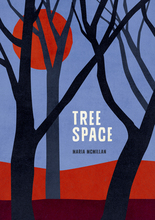Maria McMillan, Tree Space, Victoria University Press, 2014
(Thanks to VUP I have a copy of the book for someone who likes or comments on this post)
Maria McMillan’s biography tag on the back of her new book, Tree Space, fascinates me: ‘Maria McMillan is a writer, activist and information architect who lives on Kapiti Coast.’ Fascinating in the way these four key elements rub against each other.
Maria’s debut poetry book, The Rope Walk, was published by Helen Rickerby’s Seraph Press in 2013. It was a terrific arrival, and the sorts of joys that I fell upon there have been carried through into her new collection. As I wrote in my review for Poetry Shelf:
‘The poems are observant, musical, reflective and measured. The collection signals the craft and joy of small poems, words that are gathered together in a minor key where time stalls and you relish a moment. Maria knows how to write with the perfect degree of emotional seasoning and revelation (I will tell you this, but I will not tell you that). There was a sense of hide and seek for me as I read (and indeed there is a poem called ‘Hide and seek’).’
Tree Space is Maria’s first full poetry collection, and the poems have been written over more than a decade. Yes, there is a range of subject matter, style and inclinations, yet there is also a satisfying degree of cohesiveness. The poems step out from diverse starting points, yet frequently that starting point is a pivot for meditation. To me the poem provides an opportunity to delve deeper, to sidetrack and to offer slithers of anecdote.
What binds this book more than anything (although the deft ear comes close) is the way these poems, as poetic space, host relations. One of the delights of poetry is the way a poem reproduces and produces a series (‘set’ is too limiting a word here) of relations—whether aural, semantic or via tropes. There are relations amongst sounds, images, ideas and feelings. Some poets want to activate movement amongst all, others less so. You might fall upon relations between the real, the cerebral and the imagined. Relations between people, places and things. In my view, Tree Space is a treasure trove of poetic connections—combinations that continually jumpstart the reader.
The collection opens with ‘Song.’ An opening that is punctured, punctuated, startling. An opening that links sparrow to poet, the voice box to breath, the voice box to concealment (‘a parcel’) and revelation (anatomic). Pronouns tremble with ambiguity. Whose heaving chest? Hidden in the crevices is the ability to sing, the yearning to sing and the doubt ‘she’ can sing. And thus we enter the collection that sings.
The starting point as a pivot for poetic excursions is beautifully realised in the poem ‘salt marsh and tidal inlet.’ These words caught the poet-reader’s eye while ‘The other words get/ sucked back into the paper.’ It is as though the poet daydreams and we are caught up in her reverie, the words folding back upon each other, the nostalgic trip wires, the little spotlights on where you are and where you’ve been. Glorious!
In ‘Hairy Star,’ it is the breathless wonder at seeing the comet that the poet wants to preserve and remember for her sleeping child that hooks me, and the stepping stone between that sleeping form and the poet’s own little self. The own self: ‘Or my own self, carried to the steps by the back door/ to see a hedgehog. Milk in the saucer. Small noises.’ The sleeping child: ‘You were. In bed covered in pen marks and plum./ Sleeping. Outside your closed curtain/ half-painted trellis.’
I love the way the teapot in the poem, ‘In the very middle,’ transports you to all things strange, and the way ‘a polished cake spoon’ can show you yourself as ‘monsterish and wary.’ Again the pivot, the relations and the meditations.
There are so many poems that stand out for me (perhaps a tiny cluster at the back that don’t)—poems that generate myriad notes in my notebook. Maria is able to capture the luminous instance, a moment in time that becomes imbued with heat or longing or youthfulness. A moment that might be autobiographical or on the other hand invented. She steps into the shoes of others as adroitly as into her own.
‘Paradox’ finds truth in the way sunflower seeds are both fast and slow growers and the way pumpkins are both heavy and light (and more examples). Maria’s poems are like that paradoxical pumpkin—exuding a tantalising simplicity of form and line yet embracing space that is sweetly fertile. Her poems are quick to the ear and a slow release to the mind. You save the room to move and the detail that sticks. These poems take exquisite flight whilst keeping toes in the soil. I loved this collection.
Victoria University Press page
Seraph Press page
VUP interview
Maria’s blog
Poetry Shelf interview with Maria
Interview with Janis Freegard



This sounds fantastic. I’ve been trying to read more poetry that talks about the natural world lately. I really love this blog, Paula!
LikeLike
Thanks Jane. I am juggling balls, juggling balls at the moment.
LikeLike
You are! It’s great for everyone else, though. I was recently talking about you to a friend and we were singing your praises, saying what a brilliant force for NZ poetry you are. Keep on! x
LikeLike
I have to read this! Beautiful cover.
LikeLike
I can’t wait to read this book. Now if only I had a copy…
LikeLike
Pingback: Congratulations The giveaway copy of Maria McMillan’s Tree Space | NZ Poetry Shelf
Pingback: Tuesday Poem: ‘Meditations’ by Maria McMillan | the red room